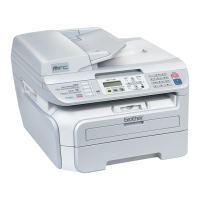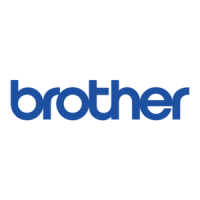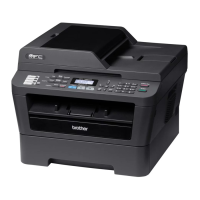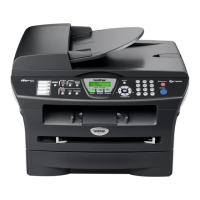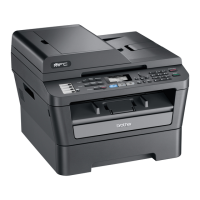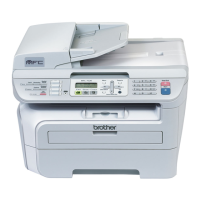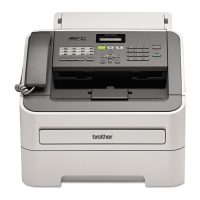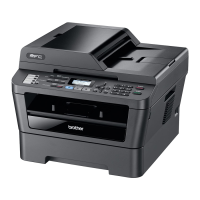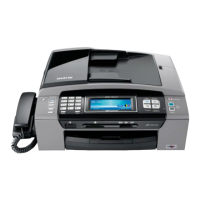Do you have a question about the Brother MFC MFC-7840W and is the answer not in the manual?
Details on the user's guide and product models.
Information required for contacting customer service.
Instructions and benefits of registering the product online.
Information on ordering genuine Brother accessories and supplies.
List of consumables and accessories with part numbers.
Legal disclaimer regarding software warranties and limitations of liability.
Notice regarding the manual's compilation, content, and rights.
Details on who is covered, what is covered, and what is not covered by the warranty.
Steps to take if your product is eligible for warranty service and what Brother will do.
Details of the one-year limited warranty for labour and parts in Canada.
Conditions that void the warranty and exclusions for Canadian models.
Guidance on how to use the provided documentation effectively.
Explanation of symbols and conventions used throughout the manual.
Instructions on how to find and view the Software and Network User's Guides.
Instructions for scanning using the TWAIN driver, WIA driver, or ControlCenter3.
Guidance on using ScanSoft™ PaperPort™ 11SE with OCR.
Steps to view user guides in HTML format on a Macintosh computer.
Instructions for scanning documents on a Macintosh system.
Overview of ways to access Brother support, including web, customer service, and shopping.
Links to Brother's website, online store, and solutions center.
Description of keys related to fax and telephone functions.
Explanation of Menu, Clear/Back, OK, Volume, and Search/Speed Dial keys.
Function of the liquid crystal display for setup and operation.
Usage of the dial pad, Stop/Exit, Start, and Mode keys.
Functions of Secure, Job Cancel, Options, and Enlarge/Reduce keys.
Important notes on loading paper into the standard paper tray.
Step-by-step instructions for loading paper into the main paper tray.
Instructions for feeding various types of media through the manual feed slot.
Using the manual feed slot for special media types like thick paper, labels, and envelopes.
Dimensions of the unprintable margins for copy jobs.
Printable area limits when printing from a computer via drivers.
Suggestions for paper types to achieve best print quality.
Details on paper types and sizes supported by the standard tray and manual feed slot.
Capacity limits for the standard paper tray and manual feed slot.
Technical specifications for paper weight, thickness, and other properties.
Guidelines for using special paper types like labels and envelopes.
List of paper types that may damage the machine or cause performance issues.
Guidelines for selecting and using envelopes for printing.
Specific types of envelopes that should not be used due to potential damage or feed issues.
Instructions and precautions for printing on labels.
How to load documents into the ADF for scanning or copying.
Optimal temperature and humidity conditions for machine operation.
Step-by-step guide to loading documents into the ADF.
Instructions for scanning single pages or books using the scanner glass.
Setting the time before the machine returns to Fax mode or switches user.
Configuring the machine for different paper types and sizes.
How to set the volume levels for the machine's ring and beeper.
How to adjust the speaker volume for fax or standby mode.
Setting the machine to automatically adjust for Daylight Savings Time.
Features to conserve power and toner, including sleep mode and toner save.
How to adjust the contrast of the LCD screen.
Configuring a prefix number to be automatically dialed before fax numbers.
Instructions for modifying an existing dial prefix number.
How to set up and change the TX Lock password to prevent unauthorized access.
Steps to set the administrator password for security features.
Procedure to change the existing administrator password.
Configuring a public user with limited access and no password requirement.
Creating restricted user accounts with passwords and specific function access.
Instructions for enabling or disabling the secure function lock feature.
How restricted users log on and access the machine when secure lock is active.
How to set up and change the password to prevent unauthorized configuration changes.
Steps to enable or disable the setting lock feature.
Setting restrictions on dialing via the dial pad.
Applying restrictions to One Touch and Speed Dial numbers.
Steps to activate the fax mode on the machine.
Methods for sending faxes using the Automatic Document Feeder or scanner glass.
How to cancel a fax in progress or a broadcast job.
Sending the same fax message to multiple recipients.
Combining settings like contrast, resolution, and polling for fax transmission.
Setting up and sending electronic or printed cover pages with faxes.
How to adjust contrast for light or dark documents to improve fax quality.
Adjusting fax resolution for better quality or faster transmission.
Using dual access and real-time transmission features for efficient faxing.
Using real-time transmission and overseas mode for faxing.
Scheduling faxes for later delivery and optimizing batch transmissions.
Checking and canceling fax jobs that are waiting in memory.
Performing manual fax transmission and handling out-of-memory messages.
Guide to choosing the appropriate receive mode based on telephone line setup.
Details on using Manual and External TAD receive modes.
Explanation of Fax Only and Fax/Tel modes for handling calls.
Setting the number of rings before the machine answers.
Configuring the F/T ring time for voice calls in Fax/Tel mode.
Enabling easy receive to automatically answer fax calls.
Adjusting print density to make pages darker or lighter.
Automatically reducing incoming fax pages to fit paper size.
Enabling the machine to print the date and time on received faxes.
Sending a fax after a conversation has ended.
Retrieving and printing faxes stored in the machine's memory.
Managing conflicts and interactions between Voice Mail and the Brother machine.
Using Voice Mail and Distinctive Ring services with the machine.
How telephone company's Distinctive Ring service works.
Steps to register a Distinctive Ring pattern with the Brother machine.
Addressing potential conflicts between Voice Mail and the machine.
Instructions for disabling the Distinctive Ring feature.
Using the Caller ID service to display caller information.
How to view and print the stored Caller ID information.
Steps for connecting an external telephone answering device.
How to record an outgoing message for the external TAD.
Notes on using roll over telephone lines and ensuring compatibility.
Information on two-line systems and converting wall outlets.
Steps for connecting a two-line TAD and telephone.
How to operate the machine from extension telephones.
Specific procedures for using the machine in Fax/Tel mode.
Diagram and instructions for connecting external or extension telephones.
Explanation of fax receive and telephone answer codes.
Methods for dialing phone and fax numbers: manual, one touch, and speed dial.
Using search function and redialing busy numbers.
How to store One Touch, Speed Dial numbers, and insert pauses.
Procedure for storing up to 200 speed dial numbers.
How to modify existing One Touch or Speed Dial numbers.
Creating groups of numbers for broadcasting faxes.
Using access codes, credit card numbers, and pauses in dialing.
Switching between tone and pulse dialing modes.
Configuring the machine to automatically forward received faxes.
Enabling backup print to retain a copy of forwarded faxes.
Setting up pager notification for received faxes.
Storing received faxes in memory for later retrieval.
Configuring the machine to receive faxes directly to a PC.
Adjusting settings when changing between remote fax options.
Disabling remote fax features.
Creating a personal code to access remote retrieval features.
Steps to access stored faxes remotely using the access code.
Instructions for retrieving stored fax messages.
Modifying the default fax forwarding number.
Table of commands for changing settings, retrieving faxes, and checking status remotely.
Calling another fax machine to receive a fax.
Requesting documents from multiple fax machines sequentially.
Configuring the machine to wait for another fax machine to retrieve a document.
Generating transmission verification reports for faxed documents.
Setting intervals for automatic Fax Journal printing.
How to manually print various reports like Help List and Network Configuration.
Guidelines for selecting an appropriate and safe location for the machine.
Important safety instructions regarding high voltage, flammable substances, and handling.
Precautions to avoid injuries when using or moving the machine.
Safety advice on cleaning toner, electrical connections, and power cords.
Precautions regarding electrical storms and proximity to water.
FCC compliance information, REN, and telephone company interaction.
Statement of compliance with FCC Part 15 rules for digital devices.
Compliance statement for digital apparatus in Canada.
Safety precautions for disconnecting the device and connecting to LAN.
Statement regarding ENERGY STAR® compliance for energy efficiency.
Information on Class 1 laser product certification and FDA regulations.
Details on internal laser radiation and crucial safety instructions.
Precautions regarding electrical storms and proximity to water.
Modifying compatibility settings to reduce modem speed for fax operations.
Troubleshooting specific error messages like Cartridge Error and Size Mismatch.
Resolving issues related to machine cooling and open covers.
Troubleshooting document jams and errors like DR Mode in Use.
Addressing fuser errors, initialization failures, and various paper jam types.
Troubleshooting 'No Paper', 'No Response/Busy', and 'Not Registered' errors.
Resolving the 'Out of Memory' error for fax and print operations.
Troubleshooting the 'Print Unable XX' error message.
Addressing 'Scan Unable XX' errors and toner/drum issues.
How to transfer faxes and reports when encountering errors.
Methods for transferring faxes to another fax machine or your PC.
Procedure for forwarding the Fax Journal report.
Step-by-step instructions for removing jammed documents from the ADF and cover.
Procedure for removing jammed documents from the output tray.
Steps to clear paper jams within the main body of the machine.
Caution regarding hot internal parts after use.
Steps to remove jammed paper from the output tray and paper tray.
Instructions for clearing paper jams from the rear of the machine.
Steps to remove jammed paper from the fuser unit.
Procedure for clearing paper jams within the drum and toner cartridge assembly.
Steps for cleaning the outside of the machine and the paper tray.
Instructions for cleaning the scanner glass and ADF scanner strip.
Procedure for cleaning the laser scanner window, with warnings.
Steps for cleaning the corona wire inside the drum unit.
Procedure for cleaning the drum unit, including toner handling precautions.
Details on toner cartridge life and drum unit replacement.
Estimated page yield for the drum unit.
Step-by-step guide for replacing the toner cartridge.
Instructions for removing and installing the drum unit.
How to view the machine's serial number and page count.
Viewing the remaining percentage of drum life.
Instructions for properly packing the machine for transport or return.
Explanation of menu keys and on-screen programming.
Information on how menu settings are stored and temporary settings.
Step-by-step guide to accessing and selecting menu options.
Detailed menu options for Mode Timer, Paper Type, and Paper Size settings.
Menu options for Volume, Security, Ecology features, and LCD Contrast.
Configuration for receive modes, print density, and auto reduction.
Settings for fax contrast, resolution, delayed fax, and batch transmission.
Options for real-time, polled, and overseas fax transmission.
Settings for cover pages, quick dialing, and report configurations.
Settings for fax forwarding, paging, storage, and PC fax receive.
Options for restricting dialing via dial pad, one touch, and speed dial.
Settings for Caller ID, copy quality, and contrast.
Printer emulation and configuration options.
Settings for BOOT method, IP address, Subnet Mask, Gateway, Node Name, WINS, DNS, and APIPA.
Configuration for IPv6 protocol and Ethernet link mode.
Settings for scanning to FTP and resetting network configurations.
Settings for wired LAN TCP/IP, including BOOT method and IP configuration.
Options for Ethernet link mode, default reset, and wired LAN enable.
Configuring wireless LAN TCP/IP and using the setup wizard.
Configuring wireless network security (SES/WPS/AOSS, WPS w/PIN) and setup wizards.
Checking wireless network status, signal strength, SSID, and communication mode.
Restoring wireless network settings and configuring scan to FTP.
Viewing machine's serial number and page counts.
Basic setup for receive mode, date/time, station ID, dial tone, and dial prefix.
Step-by-step guide to accessing and selecting menu options.
Detailed menu options for Mode Timer, Paper Type, and Paper Size settings.
Menu options for Volume, Security, Ecology features, and LCD Contrast.
Configuration for receive modes, print density, and auto reduction.
Settings for fax contrast, resolution, delayed fax, and batch transmission.
Options for real-time, polled, and overseas fax transmission.
Settings for cover pages, quick dialing, and report configurations.
Settings for fax forwarding, paging, storage, and PC fax receive.
Options for restricting dialing via dial pad, one touch, and speed dial.
Settings for Caller ID, copy quality, and contrast.
Printer emulation and configuration options.
Specifications for color, TWAIN/WIA compliance, and scanning resolution.
Dimensions for ADF and scanner glass, and scanning width.
Details on printer emulations, drivers, and print resolution.
Specifications for print speed, first print time, and connection interfaces (USB, LAN).
Minimum system requirements for Windows operating systems.
Minimum system requirements for Macintosh operating systems.
Estimated page yields for starter, standard, and high-yield toner cartridges.
Estimated page yield for the drum unit.
Details on LAN connectivity, network printing, scanning, and PC Fax support.
Supported protocols (TCP/IP) and network management utilities.
Details on wireless LAN connectivity and network support.
Supported wireless protocols and management utilities.
Supported authentication methods for wireless network access.
Supported encryption methods for securing wireless data transmission.
Rules for network keys based on security methods.
Information on Wi-Fi certification for interoperability.
Using one-push setup (SecureEasySetup™, Wi-Fi Protected Setup™, AOSS™) for wireless configuration.
Definitions for ADF and Auto Reduction features.
Definitions for fax transmission types and coding methods.
Definitions for compatibility, contrast, and delayed fax features.
Definitions for Easy Receive, ECM, extension telephones, and external telephones.
Definitions for fax tones, Fax/Tel mode, fine resolution, and gray scale.
Definitions for One Touch, Out of Paper Reception, Overseas Mode, and Paging.
Definitions for Pause, Polling, Pulse dialing, and Real Time Transmission.
Definitions for Scanning, Search, Speed Dial, Station ID, and TAD.
Definitions for Telephone Answer Code and Tel Index List.
Index entries for accessories, ADF, broadcasting, and Brother information.
Index entries for canceling jobs, cleaning, connecting, and distinctive ring.
Index entries for document jams, drum units, and fax codes.
Index entries for fax forwarding, fax storage, and Fax/Tel mode.
Index entries for labels, LCD, machine information, and maintenance.
Index entries for network, one touch dialing, and paper specifications.
Index entries for print, quick dial, remote retrieval, and reports.
Index entries for resolution, safety, scanning, and security features.
Index entries for shipping, sleep time, speed dial, and TAD.
Index entries for voice mail, warranties, and wireless network information.
| Print Technology | Laser |
|---|---|
| Print Resolution | Up to 2400 x 600 dpi |
| Paper Capacity | 250 sheets |
| ADF Capacity | 35 sheets |
| Scan Resolution | Up to 19200 x 19200 dpi (interpolated) |
| Fax Modem Speed | 33.6 Kbps |
| Functions | Print, Copy, Scan, Fax |
| Maximum Copying Resolution | 600 x 600 dpi |
| Optical Scan Resolution | 600 x 2400 dpi |
| Wireless | Yes |
| Copy Resolution | 600 x 600 dpi |
| Fax Transmission Speed | 33.6 Kbps |
| Display | LCD |
| Weight | 25.6 lbs |
| Connectivity | USB, Wireless |
| Scanner Type | Flatbed |
| Connectivity Technology | Wireless, USB |
| Printer Type | All-in-One |
| Scan Type | Flatbed, ADF |
